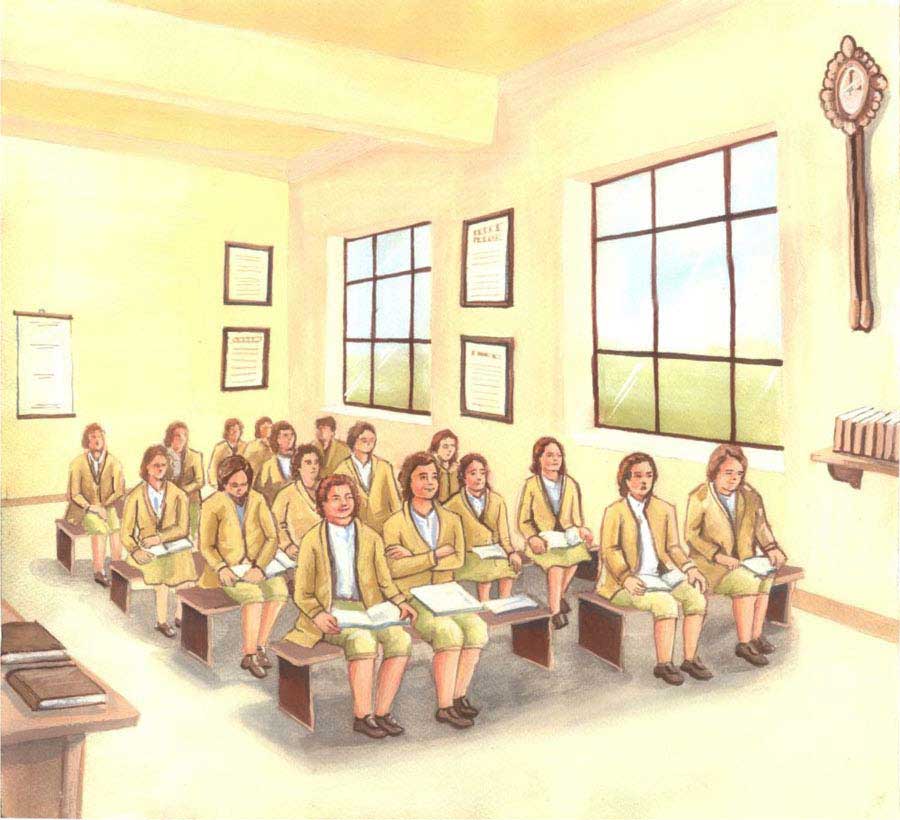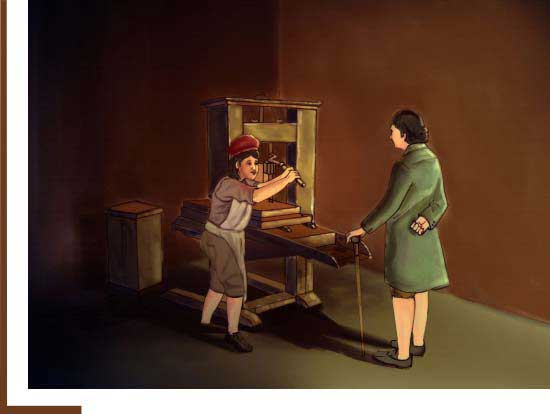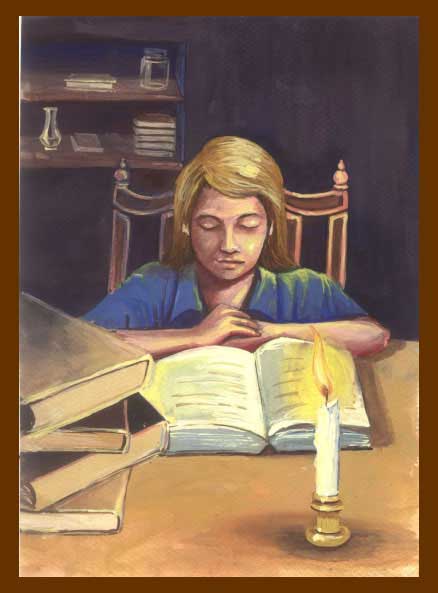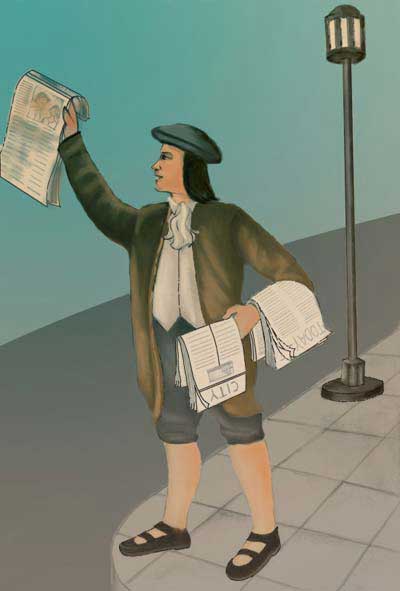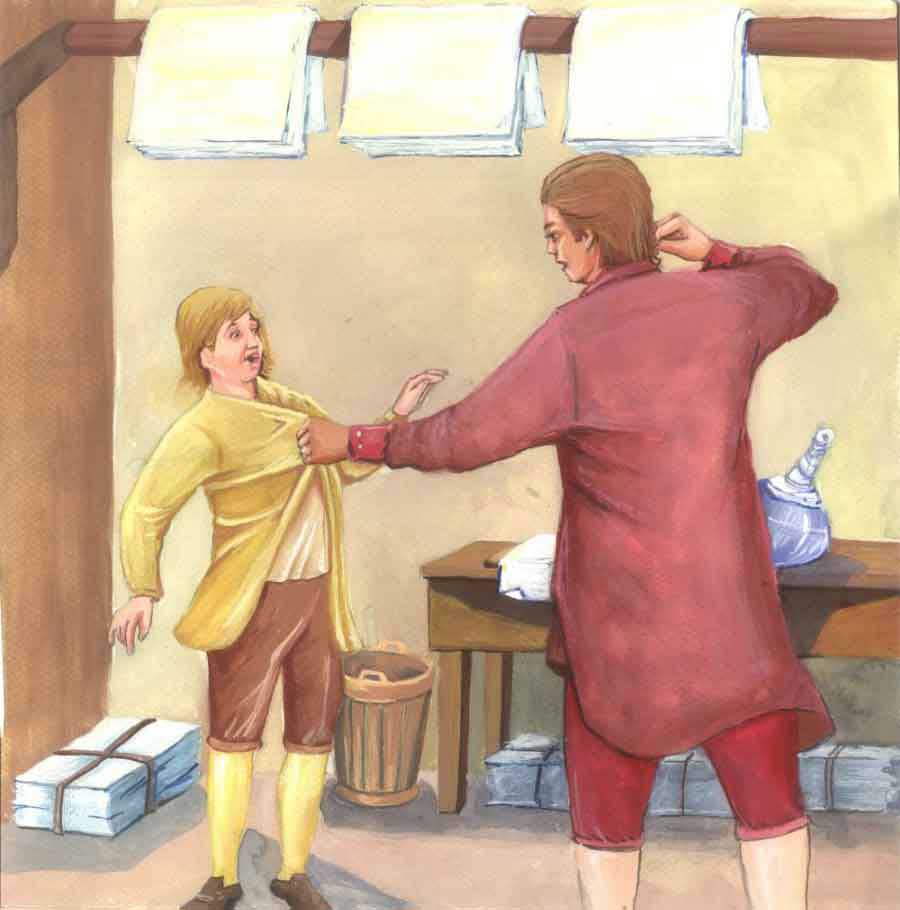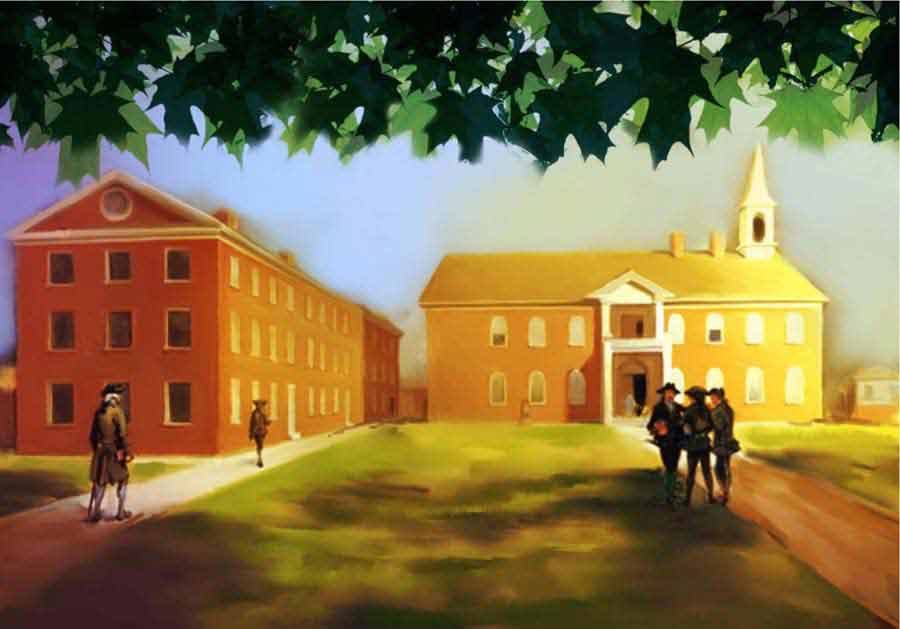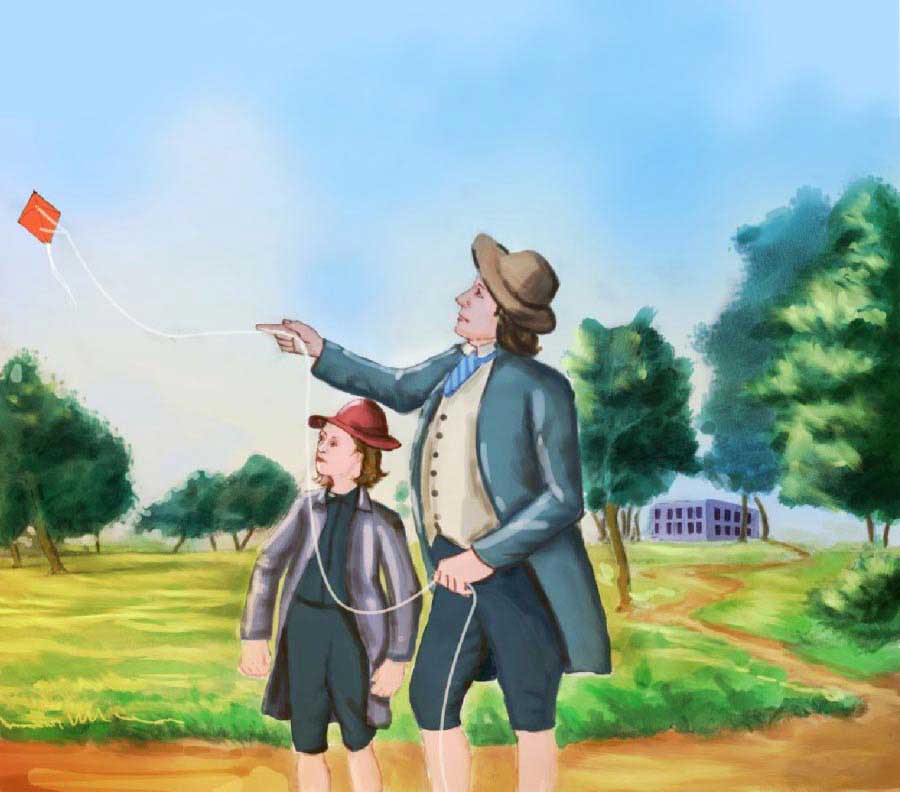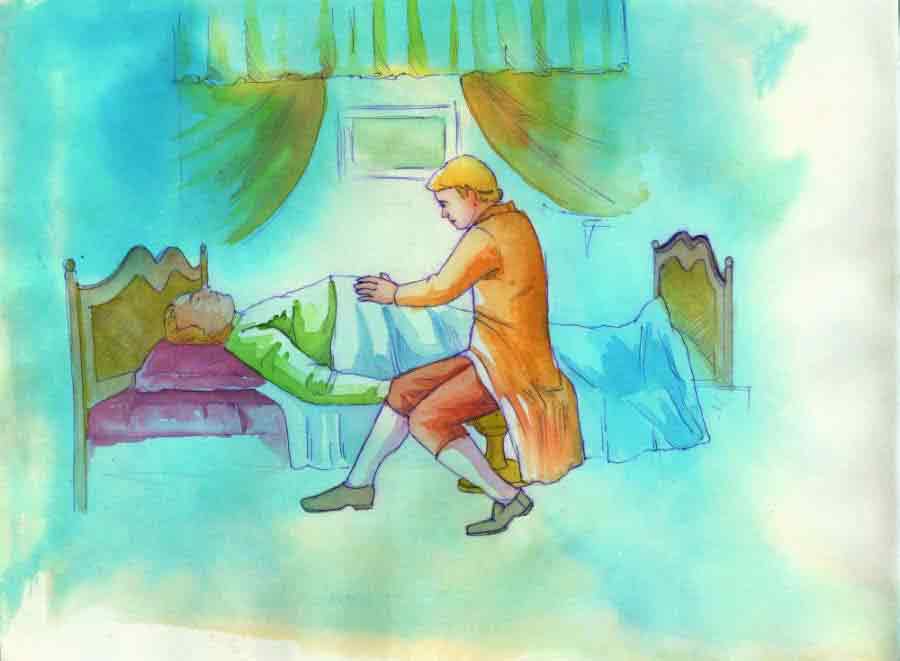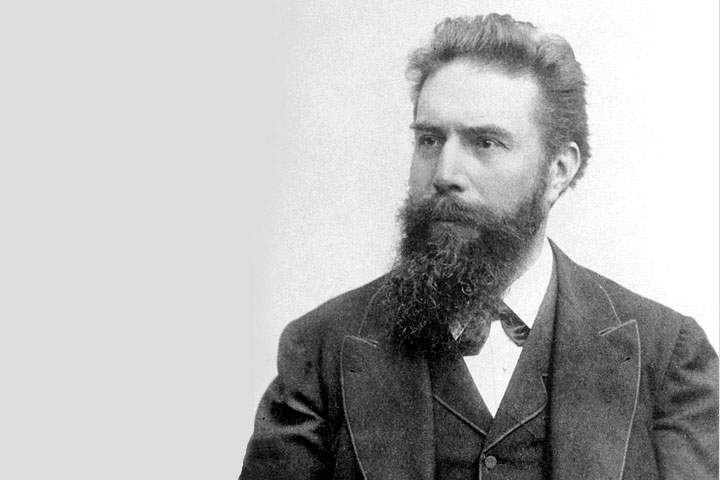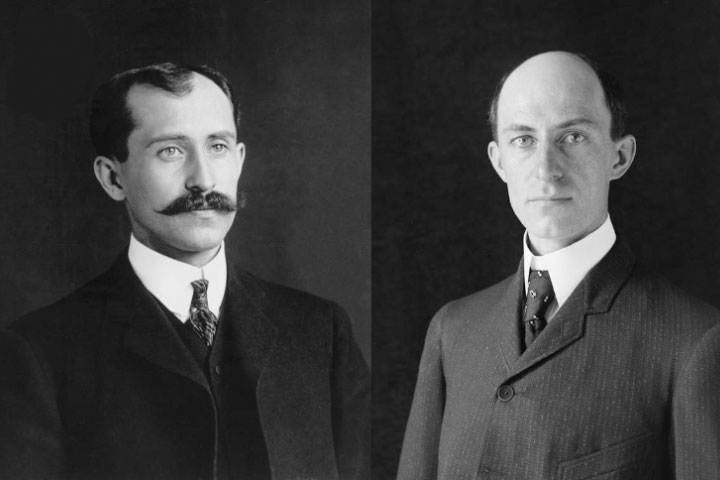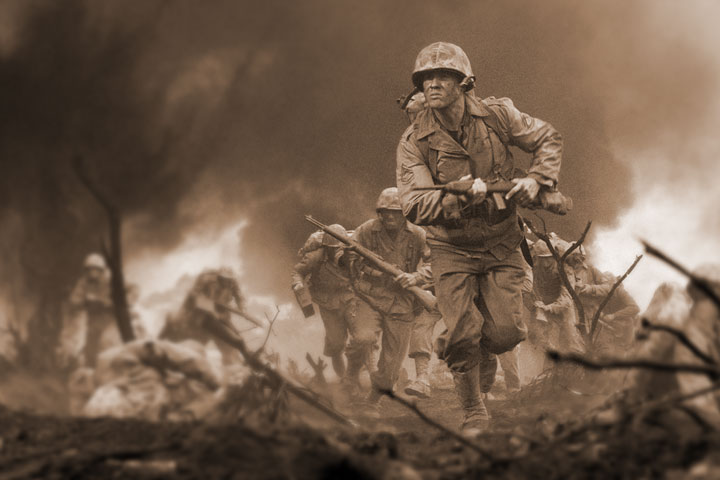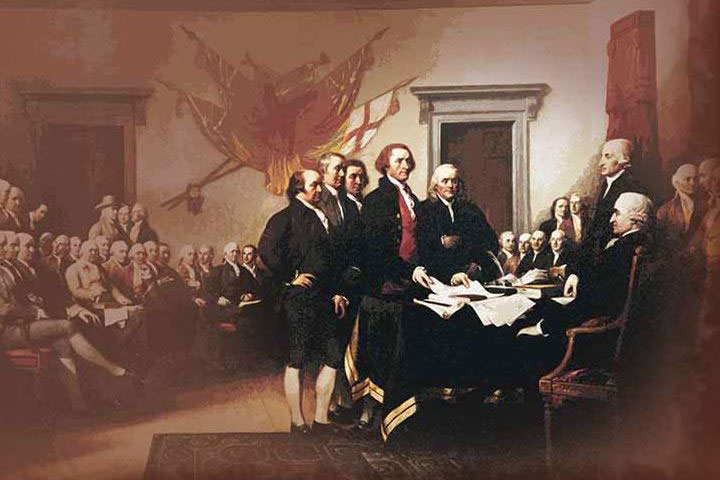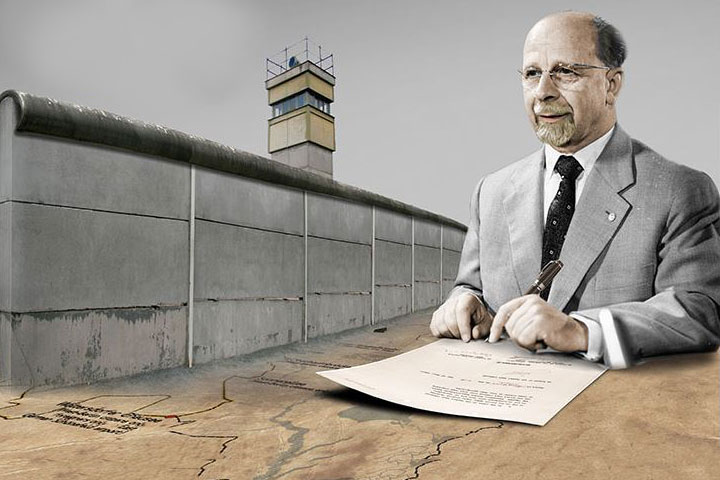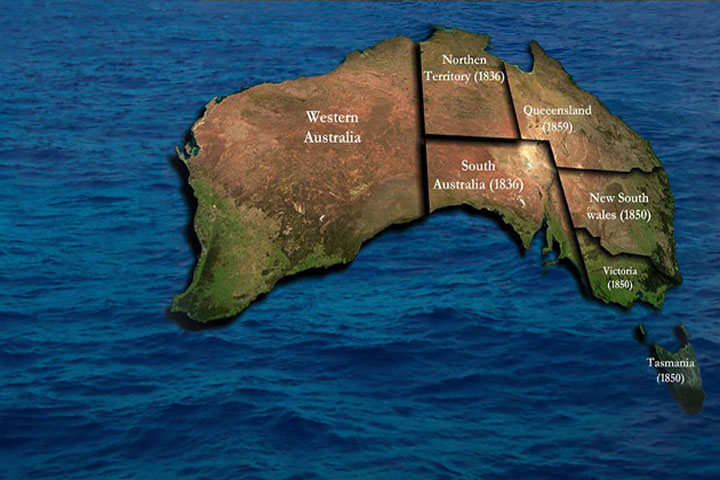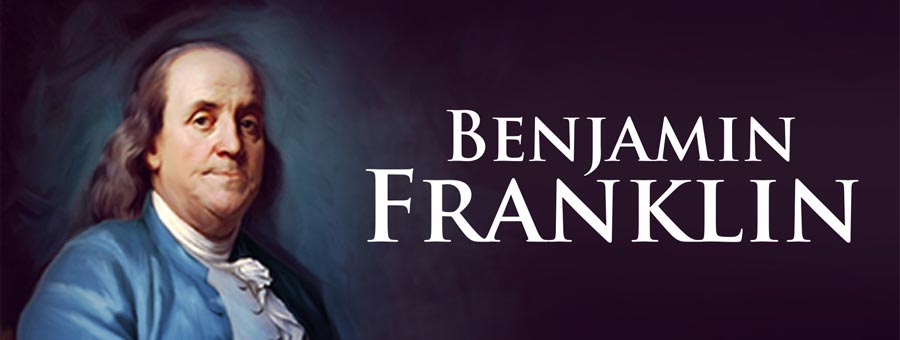

Introduction
Benjamin Franklin is the kaleidoscopic personality of such immense talents and ability that summing up his life and work in a few lines or finding a label for him is next to impossible. He is one of the founding fathers of America and undoubtedly the most influential personality in the history of the country. His achievements are unbelievably vast and varied. He was a writer, printer, editor, linguist, musician, thinker, a genius inventor, an expert administrator, a leader and a diplomat par excellence.
More than 200 years after his death, Franklin remains one of the most celebrated figures in the US history. His image features on the $100 dollar bill and many towns, schools and educational and business institutes are named after him.
Franklin’s journey from the son of an ordinary soap maker to the most influential figure in the social and political history of America is an amazing tale of untiring hard work, steely determination, relentless efforts for self development and the tremendous courage to accept and overcome any challenge that may come along the way. His extraordinary intelligence, spirited attitude and refreshing wit saw him through many trials in his life and also proved instrumental in his great achievements.
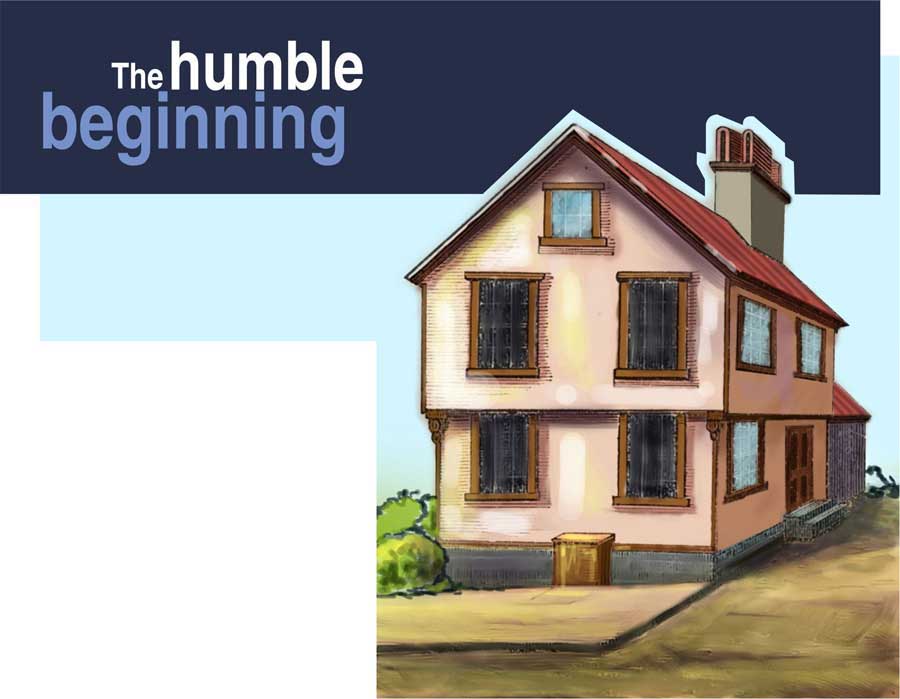
The Humble Beginning
Benjamin Franklin was born in Boston on January 17, 1706, to Josiah and Abiah Franklin. Josiah was a poor soap and candle maker. Abiah was his second wife. He had seven children from his first wife and ten more from Abiah. Benjamin, their youngest son was named after his uncle who was very dear to his father.
Growing up with sixteen siblings, childhood was anything but comfortable for young Benjamin. His childhood probably had all the hardships that are part and parcel of being born to parents in unsound financial condition.
Even though Josiah was not a man of great means, he was well respected in the neighbourhood and people often consulted him on many community matters because of his profound understanding and great judgement. He often acted as a mediator between two quarrelling parties. He also had a flair for mechanical things that often came in handy around the house. Benjamin probably inherited these two traits from his father. Benjamin’s another important trait; the ability for toiling untiringly must have come from his mother. Josiah not only helped her husband with his business but also looked after household duties and fed seventeen children.
The Franklin shop and house was situated on the Milk Street opposite the Old South Church. Benjamin’s parents were members of this church. Probably that is the reason Josiah had this dream of making Benjamin a clergyman. He wanted each of his children to learn some skill to be able to earn well in future. But he had different expectations from Benjamin and hoped that he would become a well educated man. Thus, he enrolled him in a grammar school at the age of eight.
Little Benjamin grasped reading and writing very fast but faced difficulties with arithmetic. Benjamin’s struggle with arithmetic was such that he could not make any progress in school. His father was forced to remove him from school and his dream of making Benjamin a clergyman, was shattered.
After being pulled out of the school in 1715, Benjamin started helping his father with his soap-making business. But his mind was never into it. He had a fascination for the sea. He learnt swimming, rowing boats and fishing and enjoyed it very much. He became an expert swimmer and always looked for ways to swim faster.
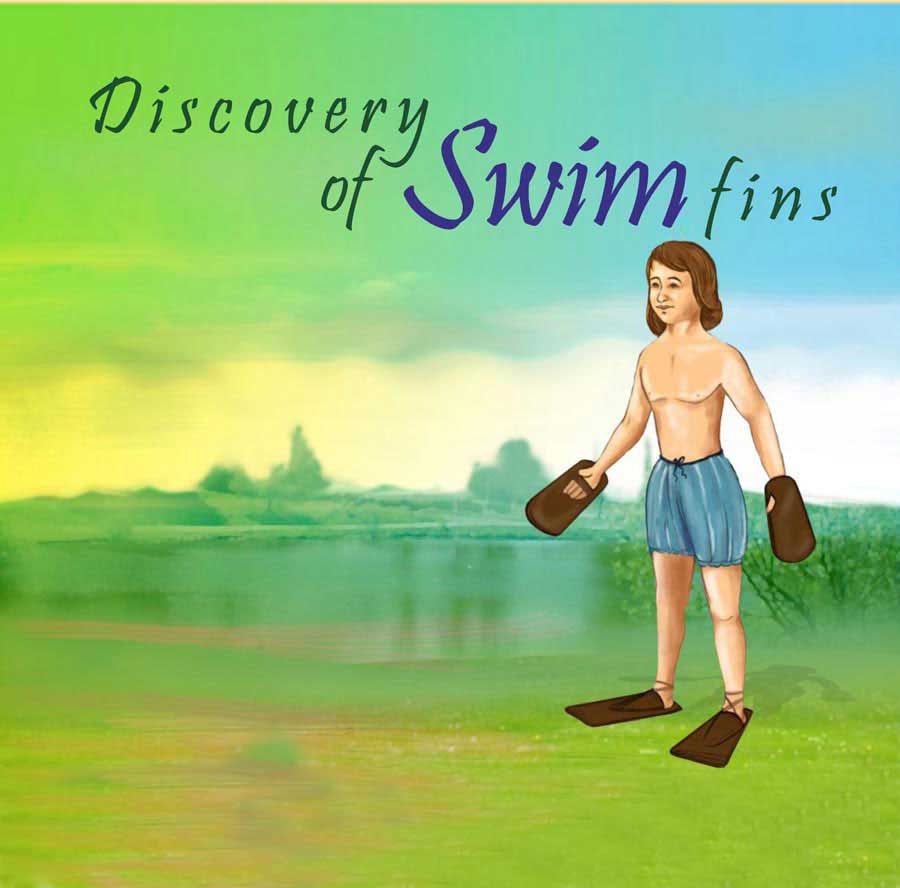
Discovery of Swim Fins
Franklin invented swim fins in 1717 when he was merely 11. Being an avid swimmer it was very natural for him to think of something that would make swimming more efficient. He wanted to swim faster and felt that just as amphibians had webbed feet, having a webbed glove- like- fin in hands could do the trick. So, he invented special swim fins. Unlike today’s modern flippers, these fins were strapped to the swimmer’s hands to make each stroke more powerful. It was a very simple but practical and useful device.
Benjamin enjoyed being around the sea very much but his father was strictly against this fascination of his. He was not going to allow Benjamin to choose any profession that would enable him to be in and around the sea. So, the unexciting and tedious work of soap-making continued until Josiah realised that his son was yearning for something else and this was not the right profession for him. He also feared that if Benjamin was not occupied with something that interested him, he may run away from home.
Sensing his son’s unhappiness, Josiah thought of engaging him in his elder son’s printing press. In those days, a printer was supposed to be a writer as well as an editor. Since Benjamin was very fond of reading, Josiah thought that it would be a suitable profession for him. Josiah was accurate in his judgement as printing was to become Benjamin’s profession for life.

The Rookie Printer
Benjamin’s elder brother James had already established himself as a printer by 1718. James was 21 and Benjamin 12 at that time. After thinking of involving Benjamin in the printing business, his father made him sign a contract to work with his brother. The contract bounded Benjamin to work as an apprentice to his brother for the next nine years till he turned 21. This new occupation proved to be a bitter-sweet experience for Benjamin.
His brother treated him meanly and even beat him up from time to time but his dealings with booksellers also presented an opportunity for a good exposure to the world of literature and philosophy. The eager knowledge seeker in Benjamin loved every bit of it.
Benjamin used to borrow books from booksellers and stay up almost the entire night reading them. He also turned a vegetarian for some time as that saved him money and he could buy books with them. He developed a special liking for poetry and even started creating and printing some of his own. James even sold some of them but their father was totally against this idea. He told Benjamin that poets usually ended up as beggars and he should not stray on this path. And thus, the budding poet was nipped in the bud!

The Young Writer
Even though Benjamin was somehow convinced about not writing poetry, he continued writing prose. He devised many writing exercises for himself to improve his grammar and overall writing skills. These exercises and voracious reading in the early years nurtured Franklin’s writing talent and also shaped his thinking.
With the knowledge that Benjamin gained from varied reading, he also developed a liking for debating. He enjoyed victories in debating and realised that difference of opinions should be expressed modestly and in the most positive manner. He also felt that nobody should force one’s opinion and thinking as the only correct way of looking at things or as the final word on anything. He believed that the chief aim of any conversation should be to inform or be informed. He felt, that if you are informing the other person in a rigid manner, the other person may resist it or may not even pay attention to you. Also, sensible men who know more than you but do not like to argue may leave you with your wrong thinking and you will miss the opportunity to learn or be better informed. This learning was one of the most important aspects of the exceptional leadership and diplomacy that Franklin displayed in his later life.

The Silent Pseudonym
Fifteen year old Benjamin not only assisted in printing it but also had the responsibility of selling it to as many people as possible. As James was publishing articles written by his friends, Benjamin also wrote some articles of his own and hoped to get them published. But he knew that James did not think much of him and would never publish his articles. So, he wrote them under the pseudonym of ‘Mrs. Silence Dogood’. These articles were full of advice on societal issues especially the ones concerning how women should be treated. Benjamin used to slip his pieces from under the door at night time and enjoy the discussions by James and his friends about it, at the day time. Soon his brother found out about it and the differences arose again.

Brothers (up) in arms
James usually treated Benjamin like a servant without giving any thought to his age or their relationship. Their disputes were often taken to their father who mostly ruled in Benjamin’s favour. This made James very angry and he would beat up Benjamin every now and then. Things were becoming very difficult for Benjamin and he did not want to continue with this apprenticeship. He was bound by the contract to do this job till he turned 21 but he wanted to get this period shortened by some means. Such an opportunity arose very soon in 1722 when James was prosecuted and jailed for a few days because of the offensive writing in his newspaper. Benjamin had to run the show in his absence.
Later, James was released from the jail on the condition that he would no longer print the newspaper with the name ‘The English Courant’. This was a big setback for James. He was advised to change the name of the newspaper and continue publishing it but he did not like that idea. After much discussion, it was finally decided that the newspaper would run in Benjamin’s name.
Once Benjamin was made the editor of the newspaper, he wanted to take full charge of the affairs and do things his way while James still wanted to keep things in his control. The differences between the brothers went too far and by 1723, it was evident that they would not be able to work together for long. When James realised this, he spoke to other printers in the town and ensured that Benjamin did not get a job with any other printer. With the doors closed in Boston, Benjamin decided to move to New York and find a job. But this was not going to be easy. Benjamin was sure of his family’s resistance to this plan. So, he hatched a plan with his friend Collins; sold his books to raise some money and fled to New York by boat.

A Whole New World
Within three days, the boat took Benjamin 300 miles away from home to the city of New York. Without any knowledge of the place or people and with very little money in his pocket, 17 year old Benjamin went to a printer named Mr. William Bradford for a job. Mr. Bradford did not have a job for Benjamin but he asked him to go to his son in Philadelphia. It was a difficult journey that lasted several days and included suffering a bout of fever and rowing the boat by himself. Benjamin finally reached Philadelphia with almost no money and only a hope to find the job. While he was roaming around the streets in a dishevelled condition, Deborah Read who was to be his future wife; saw him for the first time.
Around this time in 1723, Philadelphia was just a small town with population of less than 10,000. In Philadelphia, Benjamin found work with a printer named Samuel Keimer. Very soon, young Benjamin impressed everybody with his skills and his hard work. Benjamin’s flair for mechanical things was witnessed here for the first time. While working for Keimer, Benjamin invented a new method of casting type and making ink. He found many new acquaintances, made friends and became quite popular around the town. He even made friends with the governor of the province, Mr. William Keith. Mr. Keith gave him a letter addressed to his father and urged him to return to Boston and start his own business. He promised him all the monetary help and asked him to visit London to buy printing machinery of his choice. Benjamin trusted Keith and actually set out for London. Later, he found out that Keith’s promises did not mean anything and his offer was nothing but a hoax. However, once in London, Benjamin found some employment and lived there for two years. He enjoyed the rich social and cultural life of the city very much. He also wrote his first essay titled ‘Dissertation on Liberty and Necessity, Pleasure and Pain’ in 1724, while he was in London.

Return to Philadelphia
Benjamin returned to Philadelphia in 1726 and once again started working with his former boss Samuel Keimer. He played a major role in making Keimer’s business a great success. When Keimer received an order from the Assembly in Burlington (New Jersey) to print the first paper currency ever created in the colonies, Franklin helped in the design of the currency notes and even constructed a copper plate press for the purpose. It was the first of its kind in America. However, later some differences arose between Keimer and Franklin that ended up in Franklin quitting his job. By now, Franklin had become such an expert at his craft that he faced no difficulty in finding a partner to start his own business. He started his own printing press in 1727 with the help of a partner, Hugh Meredith, and very soon earned a reputation of being ‘the most skilled and the most industrious printer in town’. Benjamin worked very hard and made it a point to spend all his waking hours working. People saw him working from early hours in the morning till very late in the evening. Around this time, Benjamin suffered his first pleurisy attack. He recovered quickly from it but this condition troubled him later in his life.

The Newspaper Man
After being a successful printer, Franklin was now eager to start his own newspaper. There were already two weekly journals in Philadelphia, one of them being published by Franklin’s rival and former boss Keimer. Keimer’s weekly with a strangely long name ‘The universal Instructor in All Arts and Sciences: and Pennsylvania Gazette’ was successful in the initial period but soon began stumbling. Franklin was the biggest critic of this paper. When Keimer landed in financial troubles, Franklin seized the opportunity and purchased the rights of the newspaper in 1729. He shortened the name of the paper to just ‘The Pennsylvania Gazette’. Due to Franklin’s creative thinking and outstanding writing talent, the paper soon started selling well and earning handsome profits for Franklin. In the same year, Franklin became the sole owner of his print shop by purchasing the entire share of his partner.
A year later, Franklin even started printing a German language newspaper. This newspaper named ‘Philadelphia Zeitung’ was America’s first German language newspaper. Unfortunately, it did not do well and Franklin had to stop publishing it after a few months.
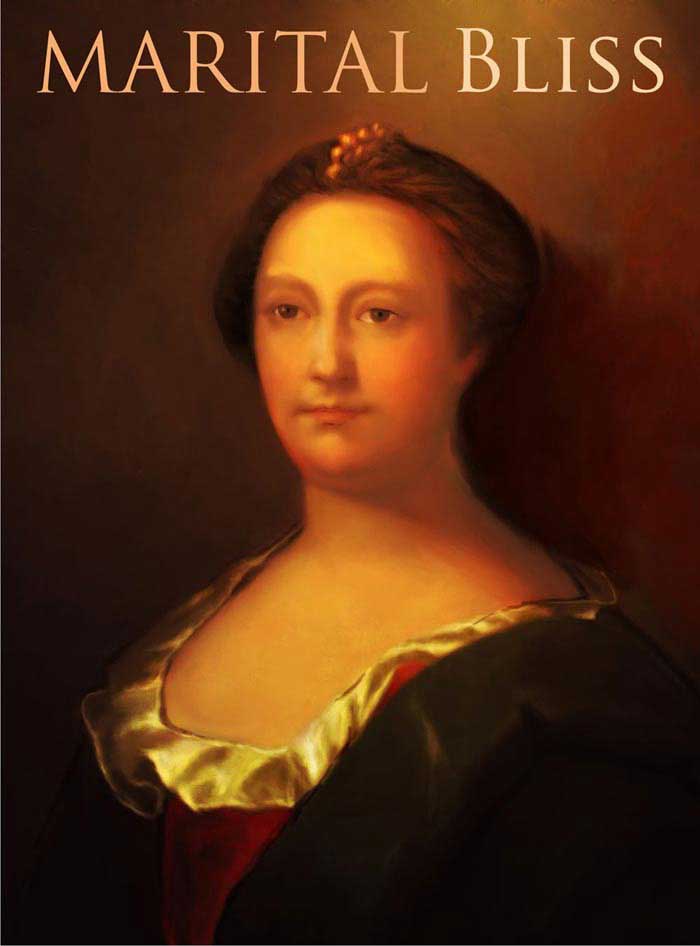
Marital Bliss
Around 1730, Franklin started desperately looking for a marriage partner. By this time, he had already fathered a son named William out of wedlock. To this day, the identity of William’s mother is a mystery. Benjamin never ever revealed the name of his illegitimate child’s mother in order to avoid any embarrassment to her. While in Philadelphia, Franklin used to stay with one Mr. John Read and had got friendly with his daughter Deborah. Love blossomed between them and they wanted to get married. However, Deborah’s mother was strongly against this match as Franklin was only 18 then with no secure job and was also set to leave on a voyage to London. In his absence for a few years, Deborah married another man but soon got separated from him. In 1730, Deborah and Franklin met again and decided to get married. Deborah accepted his son William’s responsibility and Franklin and Deborah became man and wife under the common law. Deborah and Franklin’s was a very good match and Deborah stood by Franklin in all his endeavours and trials and tribulations. Although she did not understand everything that Franklin did, she was a dutiful and devoted wife. She helped Franklin in his print shop and also looked well after William and their two children; son Francis and daughter Sarah. She also readily accepted Franklin’s simple and frugal lifestyle and tried to support him in whatever way she could.
In 1736, Franklins suffered a great loss as their four year old son Francis died due to small pox. This loss deeply affected Franklin. He loved little Francis a lot and felt that he would have turned out to be the best among his children. Francis died because Franklin had not got him inoculated. This fact bothered Franklin all his life. Even fifty years after Francis’ death, Franklin would get all emotional and weep while remembering him.

Thirteen Virtues
It was around this time that Franklin got obsessed with the idea of arriving at moral perfection. It was his ambition to live without committing any mistake at any point of time in his life. Franklin was always making efforts for self development and was constantly on the lookout to bring out the best in him. His life experiences till then had convinced him that truth, sincerity and integrity in dealing with other people were the most important things for happiness in life. He drew up a list of thirteen virtues that he thought were desirable or ‘must have’ for a person to lead a happy, successful and morally correct life. He made an effort to follow them all his life. Franklin described these virtues as –
Temperance/Control – Eat not to dullness; drink not to elevation.
Silence – Speak not but what may benefit others or yourself; avoid trifling conversations.
Order – Let all your things have their places; let each part of your business have its time.
Resolution – Resolve to perform what you ought; perform without fail what you resolve.
Frugality – Make no expense but to do good to others or yourself.
Industry – Lose no time; be always employed in something useful; cut off all unnecessary action.
Sincerity – Use no hurtful deceit; think innocently and justly; and if you speak, speak accordingly.
Justice – Wrong none by doing injuries or omitting the benefits that are your duty.
Moderation – Avoid extremes.
Cleanliness – Tolerate no uncleanliness in body, clothes or habitation.
Tranquillity – Be not disturbed at trifles, or at accidents common or unavoidable.
Chastity – Rarely used venery but for health or offspring; never to dullness, weakness, or the injury of your own or another’s peace or reputation.
Humility – Imitate Jesus and Socrates.
Franklin also believed that a virtue was not secure unless it became a habit and therefore made a continuous effort to make these virtues a habit. He also maintained a register to check how far he succeeded in practicing these virtues. He was always concerned about the larger good of the society rather than the good of the individuals. He always kept public interest before self and thought that living virtuously was more important than any worldly achievement. He lived with this belief all his life. He could not completely master all the thirteen virtues himself but the mere effort made his calibre many notches higher than his contemporaries.
Industrious Hard Worker
Franklin gave utmost importance to using all his time fruitfully and not wasting any. He believed that time is the only thing we have and the time lost never comes back. He believed, “Lost time is never found again; and what we call time enough always proves little enough. Let us then up and be doing. Doing to the purpose; so by diligence, shall we do more with less perplexity. Sloth makes all things difficult but industry all easy. Laziness travels so slowly, that poverty overtakes him.” Astonishing number of Franklin’s achievements proves that he practiced what he preached.

The Practical Thinker
Franklin was blessed with the ability for ingenious and clear thinking. He had original and practical thoughts on various matters and was a discerning and wise man. His comments on day to day affairs, big and small things in life and human nature became the popular aphorisms and adages for many years to come. Most of us are not aware that many of the commonly used sayings are actually quotes by Benjamin Franklin. Franklin also had a great sense of humour and his wit is evident in some of these sayings as well. Here are some of Franklin’s famous quotes –Early to bed, early to rise makes a person healthy, wealthy and wise.
A penny saved is penny earned ( this is actually a twisted version of Franklin’s original quote“A penny saved is two pence dear” but it became popular as the above )
Never leave that till tomorrow what you can do today.
By failing to prepare you are preparing to fail.
Tell me and I forget, teach me and I remember, involve me and I learn.
When in doubt, do not.
Little strokes, Fell great oaks.
Glass, china and reputation are easily cracked and never well mended.
Fish and guests start stinking after three days.
Be slow in choosing a friend, even slower in changing.
He that is of the opinion money will do everything may well be suspected of doing everything for money.
Keep your eyes wide open before marriage, half shut afterwards.
A good deed is the best sermon.
He that is good for making excuses is seldom good for anything else.
Beware of the young doctor and the old barber.
He that would live in peace and at ease must not speak all that he knows and must not judge all that he sees.
If you would persuade you must appeal to interest rather than intellect.
Remember not only to say the right thing in the right place but also to leave a wrong thing unsaid even at the most tempting moment.
Anyone who trades liberty for security deserves neither liberty for security.
There are many more such pearls of wisdom by Franklin that are relevant even in the present times and that can guide us through many life situations. These quotes featured in Franklin’s various writings in his newspaper, pamphlets and an almanac that he published under the name ‘Poor Richard’s Almanac’.
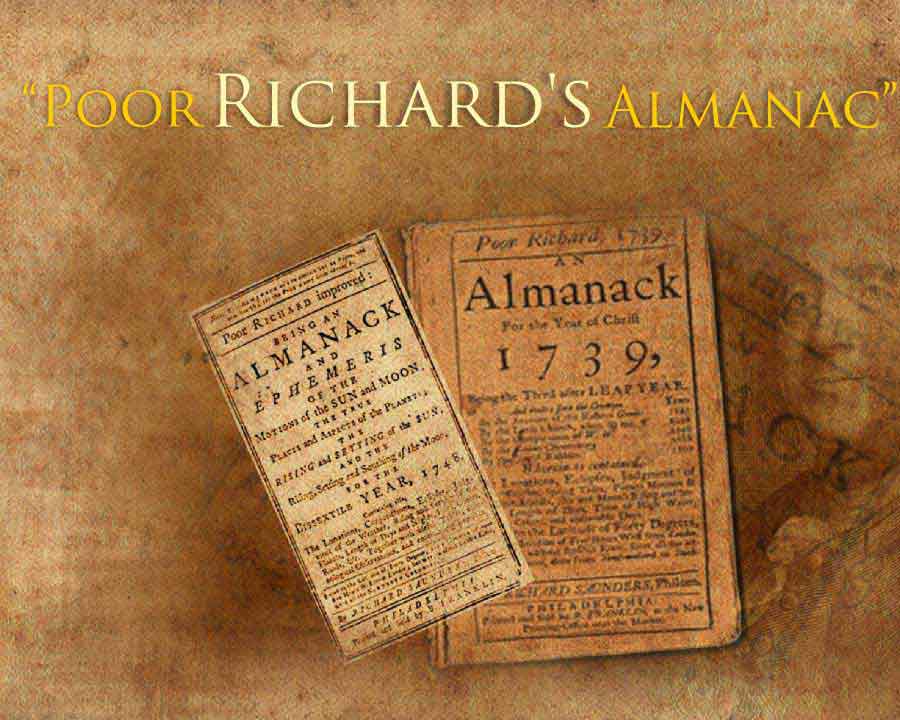
“Poor Richard’s Almanac”
Franklin was coming up with different ideas to improve his earnings from the printing business. Publishing an almanac was one of them. Franklin wrote in various forms and for some strange reason, under various pseudonyms. It all started with Mrs. Silence Dogood and later he wrote with names such as Alice Addertongue, Harry Meanwell, Polly Baker, Busy Body, Timothy Turnstone, An American, A New England man, A Briton, London manufacturer etc. One of his most famous pseudonyms has been Richard Saunders. He published an almanac under the name ‘Poor Richard’s Almanac’ which became quite popular in those times. This Richard was supposed to be a poor man who needed money to keep his ever whining wife happy. Almanacs in those times were printed annually. They contained things like weather reports, recipes, household tips, poems, predictions and advice concerning practical matters. Franklin’s almanac stood apart due to his witty and lively writing. Many of Franklin’s famous quotes are from Poor Richard’s Almanac. Franklin felt that since common people usually do not read much, so, his almanac should try and give them the knowledge and wisdom that may come with exposure to books. This almanac became so popular that it sold around 10,000 copies in 1750’s. Some editions were translated in languages like French, Italian and Slovene etc. Franklin published ‘Poor Richard’s Almanac’ for 25 years from 1732 to 1758.
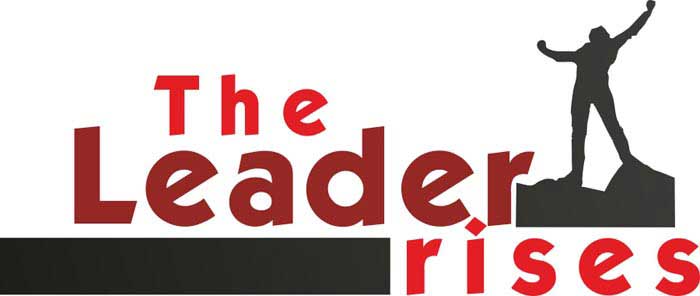
The Leader Rises
As Franklin established himself as a successful printer, his social life also started improving and he started taking active interest in matters pertaining to public life. With a lot of hard work and creative business practices, Franklin achieved success in business but he was not somebody who would remain satisfied with only making money. His intelligence, his high thinking and his interest and inclination towards public service, took him to public affairs and then to politics.
It all started with ‘Junto’, a forum established by Franklin in Philadelphia in 1727. This used to be a gathering of all the likeminded people to discuss political, religious and business matters. They discussed how to improve both their individual lives as well as the lives of the society as a whole. ‘Junto’ members were from diverse backgrounds and almost all of them were upcoming young citizens like Franklin himself. Junto became so popular that it became a matter of prestige to become a ‘Junto’ member. ‘Junto’ played a very important role in the social and political life of Philadelphia. This club and its activities went on for the next forty years. ‘Junto’ proved to be a turning point in Franklin’s life and also his first step towards the social and political leadership.
Franklin’s influence on Philadelphia’s public life was great and he is credited with starting many ground-breaking or innovative services that we take for granted today. He established the first circulation library in Philadelphia in 1730. He was instrumental in establishing an educational institute which later grew to become the University of Pennsylvania. He was actively involved in starting the first public hospital and also in establishing the first fire company in the country. He started a proper security system in the place of a haphazard and a corrupt system that was in place till that time. That was perhaps the beginning of the very basic policing. The list of such contributions by Franklin to Philadelphia’s public life is very long.
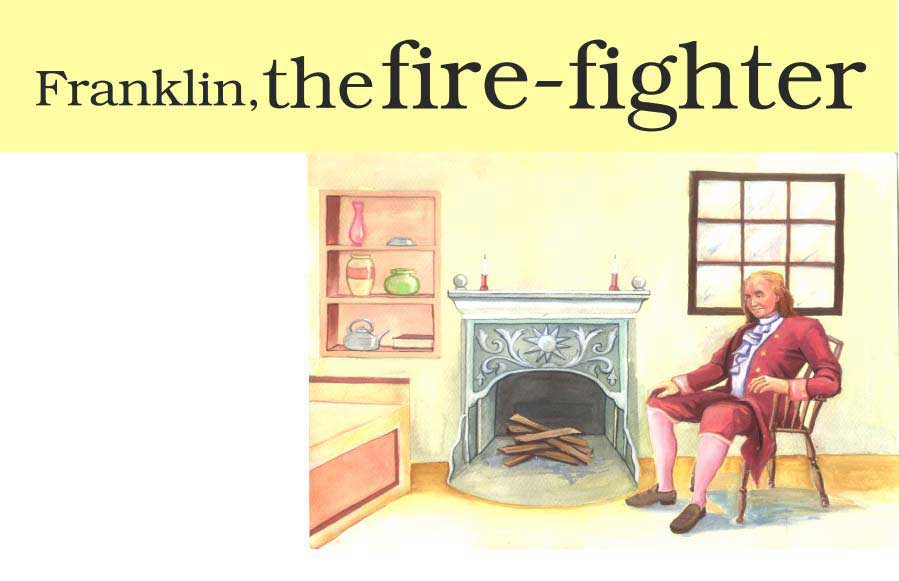
Franklin, the Fire-Fighter
Frequent fires were a big problem in Philadelphia back then. During the 18th century, fireplace was the main source of heat for homes. These fireplaces mostly used coal or wood and had a very basic design. Sparks flying out of them was a common phenomenon and also the greatest danger as these freely flying sparks used to cause fires. Houses used to catch fire due to various accidents related to the fireplace and sometimes also due to careless practices related to the fireplace.Franklin wrote an article addressing this issue and suggested various ways to avoid these accidents. His famous quote, ‘An ounce of prevention is worth a pound of cure’ isactually a fire fighting advice. He also came up with a new design of the fireplace which came to be known as the ‘Franklin Stove’. This new style of stove had a hood like enclosure in the front and an air-box at the back. Franklin also changed the basic structure a bit making it much more efficient. It used just one fourth of the wood as compared to earlier stoves and generated twice as much heat. This design became very popular and when people suggested that Franklin acquire a patent for his design, he refused to do so. He did not want to make profit from it but wanted people to benefit from it. ‘Franklin Stove’ soonbecame very popular and proved quite effective in preventing sudden fires.
In 1736, he also formed a company for quick response to fires and removing of goods in danger. This company ran on mutual assistance of members. The members kept the material like leather bags, buckets and baskets ready. They reached the place of fire as quickly as possible and carried out the relief operations. The company was named as ‘Union Fire Company’. This was the cooperative fire brigade that started with Franklin’s efforts. People in many other parts of the country copied this model later.

Deputy Postmaster General
In 1737, Colonel Spotswood, former governor of Virginia and the then Postmaster General, offered Franklin the job of his deputy. Spotswood was unhappy with his deputy’s work and his overall behaviour and negligence in keeping accounts. He felt that Franklin would be a good replacement as he had made quite a name for himself due to ‘Junto’ and its activities. Franklin accepted the offer readily and did a very good job of it. His position also helped him in improving the correspondence and distribution of his newspaper. Franklin always followed one rule – ‘Never ask, never refuse and never resign an office’. Office of the Deputy Postmaster General was just the beginning.There were many more offers to come and many more opportunities to put this rule in practice.
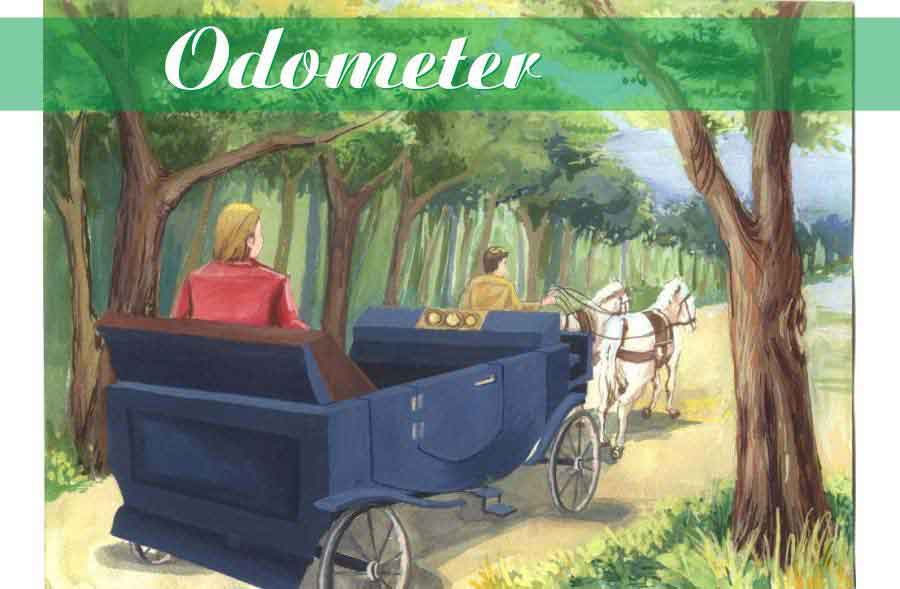
Odometer
Whenever Franklin faced some problem or a certain specific need arose, he went ahead and found a solution with his own practical invention. After ‘Franklin Stove’, he showed this trait yet again when he prepared the ‘Odometer’. While serving as a Deputy to the Postmaster General, Franklin travelled extensively to study the postal routes. He wanted to know the exact distance between two places as that was a major criterion for fixing the postage. So, in 1744, he prepared this simple device that was attached to his carriage and which measured the distance travelled by the carriage. Till that time, Odometers were mainly used to measure the distance travelled by ships but Franklin was the first one to make Odometers for the horse carriages.

American Philosophical Society
The American Philosophical Society as we know it today is an organisation of international repute that is involved in promoting knowledge in science and humanities through research, publications, meetings, library resources and public events. This organisation owes its establishment to Franklin as this society was a sister organisation of his ‘Junto’. It was Franklin who proposed and established this organisation in 1744. Franklin simply called it ‘A Proposal for Promoting Useful Knowledge’.

Establishment of the Armed forces
America in those days was a group of British colonies. Colonies were free in certain aspects of governance but under the control of British crown on many major counts. The colonies did not have their own military force and were dependent on Britain for their security. Around 1747, Franklin felt that there was a great threat to the security of the colonies as France joined forces with another enemy of Britain, Spain. British governor’s attempts to bring the militia law for the colonies had failed already. Franklin felt something could be done in this regard with the help of voluntary efforts by the people. To create awareness about this and also to mobilise people, he wrote a pamphlet titled ‘The plain truth’. In this paper, he described the gravity of the situation and very strongly emphasized the need for the military forces. This paper had a very good effect on people. Later, Franklin arranged a meeting of the citizens and garnered support of a large number of citizens. Very soon, about 10,000 people volunteered to be a part of this initiative and many military groups with a formal structure were formed all across Pennsylvania. Franklin not only preached about this but also became a part of the military force. He was offered the post of ‘Colonel’ of the Philadelphia region but he turned it down suggesting the name of a more deserving person and happily served as a common soldier.

Birth of a University
After the establishment of the military force, Franklin turned his attention to another of his pet projects of establishing an educational institute in Pennsylvania. There was no educational institute worth consideration for a proper and structured education in Pennsylvania and Franklin felt that Pennsylvanians should do something about this. He shared his thoughts with his friends in Junto and also wrote a paper titled ‘Proposals Relating to the Education of Youth in Pennsylvania’ to create awareness among people. After getting the initial support, he drew up a plan for the establishment of an academy and also collected the required subscriptions from the donors. His friends and associates helped him with this work. With the help of appointed trustees, Franklin drafted the constitution for the governance of the institution. Very soon a building was hired, teachers were engaged and in the year 1749, the institute started its operations. This institute later grew to become what we know today as University of Pennsylvania.

First Public Hospital
In 1751, Franklin’s friend Dr. Thomas Bond came to him with a proposal of building a public hospital in Philadelphia. The hospital was supposed to serve the poor and needy people from within or outside the province. This was a new idea in America of those times and therefore people could not really understand it. So, not much support came Dr. Bond’s way. But Franklin supported him wholeheartedly. He created awareness about this project, donated money and also helped in getting donations from other people. Thus, Philadelphia’s first public hospital was born.

Experiments with Electricity
While being fully active in his profession as well as in the public life, Franklin never stopped experimenting with science or things that he found interesting or stimulating. His creativity was not limited to his writing and his original thinking was not limited to social and political issues. Franklin had very little formal education but when something caught his fancy, he applied his mind and came up with amazing inventions.
Electricity caught Franklin’s fancy in the late 1740’s and along with his other activities he also started various experiments with electricity. The ‘Kite Experiment’ is the most famous among these. Franklin believed that lightening was nothing but electricity. And to prove his theory, he conducted an experiment with a kite made of silk. This kite was attached to a nylon string and at the end of the string, a key was attached. The kite was to be raised as and when the thunderstorm appeared to be approaching. As the kite got wet with rain and came in contact with electrically charged clouds, electricity was supposed to pass through the string and go to the key attached to the other end of the string. Franklin conducted this experiment in 1751 with his 21 year old son William. After waiting for a long time, Franklin saw a promising cloud and let his kite fly high in the sky. Suddenly, he observed lose strings attached to the tail of the kite standing erect. He understood that they were charged with electricity. He immediately touched the key with his knuckles and saw an electric spark and also experienced a mild electric shock. The experiment was complete and Franklin’s theory was proved. This experiment gave worldwide fame to Franklin.
Later, Franklin did many experiments in his house including installation of bells that tolled with lightening, cracking glasses with an electric current etc. Once, he tried to kill a Christmas Turkey with an electric current. He also suffered a strong electric shock himself but thankfully survived it.

Lightening Rod
During 1700s, lightning was a major cause of fires. Many buildings caught fire when struck by lightning and were burnt down completely as they were mostly made of wood. To overcome this problem, Franklin came up with a very practical invention called the ‘Lightning rod’. It was a tall and pointed rod of about 10-12 foot which was attached to the outside wall of the house and which was taller than the house by a few feet. A long cable was attached to this rod and the other end of the cable was buried about 10 feet under the ground. The rod attracted the lightning and sent the charge to the ground avoiding the danger of fire. This simple but creative invention proved that Franklin had a complete knowledge of the behaviour of electricity and also of the phenomenon called ‘earthing’.
Franklin also put forth a theory of electricity being capable of flowing like any liquid and passing from one body to another but never getting destroyed. This theory later became the basis for single fluid theory. The words like battery, charge, condenser, conductor, plus, minus, positive, negative etc. introduced by Franklin are still used in the field of electronics. Franklin turned the phenomenon of electricity that was a mere subject of curiosity, into a field of scientific study. About a year after the famous kite experiment, Franklin was awarded ‘Copley Medal of the Royal Society of London’ for his research in electricity. He also received honorary degrees from Harvard College, Yale College and the College of William and Mary around 1753.


The Shrewd Businessman
With time, Franklin’s printing business prospered. His rise in public life and his success as a printer and an editor was taking place simultaneously. His newspaper became popular and very profitable. His contacts helped him get various printing assignments from currency notes to pamphlets to books. He was firmly established as a printer. He bought a lot of properties and land in the market area of Philadelphia. He also helped many of his employees to set up their own businesses. He provided them with the required capital and machinery and asked for a share of profit in return. This arrangement helped many of his employees to have their own business and also helped Franklin to have a steady stream of income without getting directly involved in their operations.

Mr. Dependable
By 1750, Franklin almost totally withdrew himself from the day to day affairs of his business and was fully engaged in public affairs. By now, Franklin had accomplished so many things and in such a manner that people of Pennsylvania were not ready to let him be away from the public life. Some or the other office, some or the other responsibility was being put on Franklin’s shoulders and he was accepting it by being true to his rule of never refusing an office. ‘Common Council and Alderman in the Peace Commission’, Burgess to represent people in the Assembly, Member of a commission to draw up a treaty with native Indians, Deputy Postmaster General of North America etc. were some of the offices that he served after 1750.
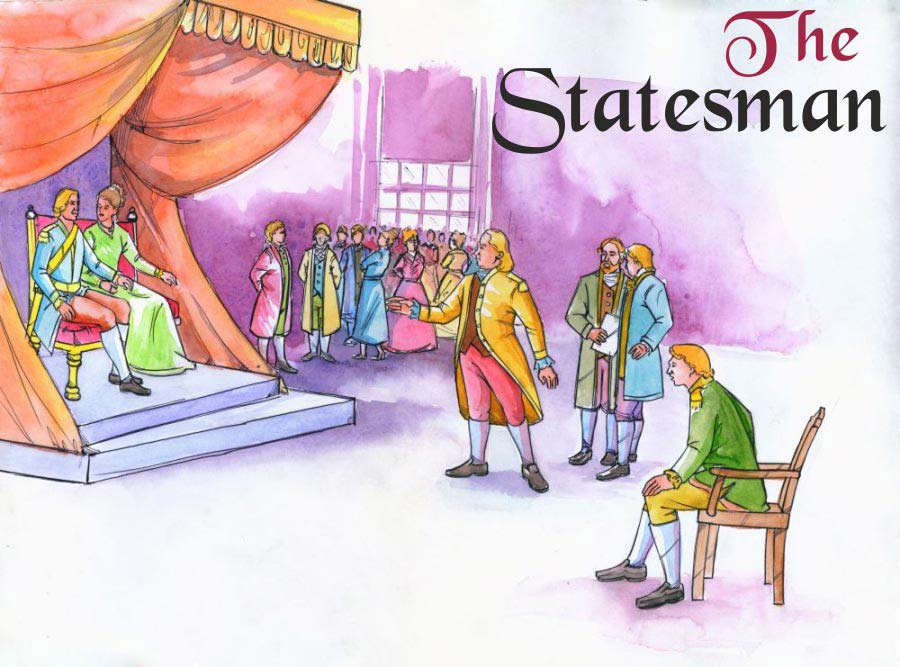
The Statesman
To understand Franklin’s contribution as a statesman, one must have some idea of the political situation in the 18th century America. In those days, America was a cluster of British colonies ruled mainly by the British Parliament. Colonies had powers regarding some internal governance issues but the real control rested with the British Parliament. There was a constant unrest in the colonies against various laws and regulations made by the British Parliament. There was also an ever growing demand for more power and self-rule for the colonies. It was politically a very crucial period in the history of America. Franklin, the able statesman and a top class diplomat represented the colonies for various petitions to the British Parliament and later played a very important part in the formation of the union of the colonies that we know as the ‘United States of America’ today.
Franklin participated in the final struggle between France and England in America. On the eve of the conflict in 1754, commissioners from several colonies were ordered to meet at Albany for a conference and Franklin was one of the representatives from Pennsylvania. On his way to Albany, he drew a plan for the union of all the colonies under one government for defence and other important purposes. This proposal was then rejected by the representatives of other states but later the same draft was used as a guide while drafting the Constitution of the United States.
In 1757, Franklin went to England to represent Pennsylvania in its fight against the proprietors of the colonies, the Penn family. The issue was who should represent the colony. The Pennsylvania legislature had formulated a petition for the king of England against the Penns. With the support of the Pennsylvanian legislature, Franklin set out for England to deliver the petition personally to the king of England. Franklin reached London in July 1757. He thought he would be there for a few months at the most but he ended up staying there for about five years and remained closely linked with the affairs in England and Europe in general.

The Music Lover and the Glass Armonica
Franklin had a keen interest in music and was a musician himself. He used to play the Harp, Guitar and Violin. His work and his engagements as a diplomat did not stop him from enjoying music or thinking about it. Once he was listening to a concert by Ms Marianne Davis in London where she played music with wine glasses tuned by filling water to different levels. This inspired Franklin to prepare his own version of a musical instrument that did not require tuning with water. He used the glass pieces cut in proper size and shape having just the required thickness so that they could create notes at a proper pitch. He arranged these pieces on a spindle in a very compact manner. This spindle could be turned by a foot treadle. Thus, Franklin’s new version of the instrument was complete and ‘Glass Armonica’ was born in 1761.
Franklin’s Armonica became popular in England as well as the rest of the Europe. Even Mozart and Beethoven composed music for it. Franklin was very proud of this invention and said, “Of all my inventions, the Glass Armonica has given me the greatest personal satisfaction”.

The Grind continues...
Meanwhile, Franklin’s diplomacy on the matters of the colony continued. Meeting with some of the most powerful leaders and parliamentarians in Briton, Franklin emphasized the importance of the American colonies. As per the aristocratic traditions, British Government was based on the principle that some individuals are by birth entitled to a greater authority and privilege than others. Colonial America on the other hand stood on ideals that were totally opposite to the British ideals. There, all men were considered equal. Franklin tried to make the British understand these fundamentals. But Franklin’s efforts were neither enough to convince the British rulers nor were they interested in playing the judge in the tussle for power between the Penn family and representatives of the colonies.
Disappointed, that the negotiations with the Penns failed, Franklin sailed home in January 1762. While in England, people of Philadelphia had elected Franklin to the Pennsylvania legislature in honour for his service to the colonies. In a clever bid to influence Franklin, the British appointed Franklin’s son William as the Governor of the New Jersey colony around the same time. The British thought that naming William to the post would help in gaining Franklin’s support but Franklin was not to be swayed so easily.
In 1763, British and French signed a peace treaty, temporarily suspending their ongoing conflict. But this treaty did not extend to the native Indians who continued to attack the colonies. Colonial forces retaliated and a riot like situation arose. But being a very kind and compassionate man, Franklin opposed the mindless killings of the Indians by armed forces or citizens of the colonies. He also handled the riotous mob very tactfully. People of Pennsylvania were overwhelmed by Franklin’s handling of the situation. As a mark of appreciation for this and also for the many years of service that he had given to the colony, he was elected as the speaker of the Pennsylvania legislature.

The Postmaster
Franklin also served in various capacities in the postal department. He was a deputy to the Postmaster General of Philadelphia in 1737, Joint Postmaster General of the colonies for the crown from 1753 and Postmaster for the United Colonies in 1775. Franklin’s contribution to America’s postal service is invaluable. He changed the face of the postal service by improving the overall efficiency level in many ways. As the Postmaster General, he visited nearly all the post offices in the colonies and introduced many improvements in the service. He established new postal routes and reworked on the existing ones. He travelled extensively to find out the shortest possible or the most efficient routes between two places and worked out the postal department’s routes accordingly.
In 1762, while Franklin was back from England for a brief stint, he mapped all the postal routes of the colonies. His painstaking effort was also useful in determining postages. Some of the standards set by Franklin to calculate the postage according to the distance are still in use.

Map of the Gulf Stream
Franklin always wondered why sailing from America to Europe took less time than the journey back. Franklin probably got interested in this due to his concern about mail deliveries. He was the first scientist to study and map the Gulf Stream. He measured wind speeds, depth of the currents, temperature etc. and prepared the first ever map of the Gulf Stream around 1764-65.

The Diplomat Par Excellence
In 1764, Franklin was again sent to England to renew a petition for the royal Government for Pennsylvania and he became the representative of the American colonies against the king and the parliament.
The petition by the Pennsylvanian legislature was turned down by the king. In 1765, English Parliament passed the Stamp Act despite Franklin’s warning and objections raised by him. This act imposed duties on many things of common use in American colonies but denied any representation for them in the parliament. The colonies were dead against this. ‘No representation, No duty’ became the rallying cry of the colonies that opposed the Stamp Act. Franklin worked diligently for the revoking of this act. In order to achieve this, he gathered support from the British merchants who were suffering losses due to colonial boycott. He also wrote many pamphlets and articles in newspapers advocating the stand of the colonies and also presented arguments in the British Parliament. When the British claimed that the tax was in return for the protection given to the colonies, Franklin turned the table by arguing that it was the colonies that had in fact helped the British in the war effort. In March 1766, the Stamp Act was finally revoked and Franklin was hailed as a hero. Franklin was very happy to get the news but he remained pessimistic about the relation between the colonies and the British Parliament in the future. He knew that there were going to be many more differences.
Meanwhile, impressed with Franklin’s diplomacy, the colonies of Georgia, New Jersey and Massachusetts also chose him as their representative.

The Trial
With each passing year, tension between the British rulers and their colonies in America was intensifying. Amidst all this turmoil, Franklin was accused of intercepting the letters of the then governor of Massachusetts, Thomas Hutchinson, through his informants. The British Parliament was outraged at this and Franklin was called before the ‘Lord’s Committee of His Majesty’s Privy Council for Plantation Affairs’ (Colonies were sometimes referred to as ‘plantations’). At the age of 68, Franklin was required to stand an hour and a half in parliament and face all the unfair allegations. Just a day after this, Franklin received a letter of his dismissal from the office of the Postmaster General. It was a blow that affected Franklin very deeply. He was very attached to this work and proud of the things that he could achieve there. Within a few months, in December 1774, Franklin received another blow as the news of his wife Deborah’s death back home, came. This was a difficult time for Franklin. The insults he faced at the hands of British rulers changed his perception. He no longer considered himself a British American but merely an American citizen.

Back To Where He Belonged
In May 1775, Franklin was back in Pennsylvania. The morning after his arrival, he was chosen as the delegate to represent Pennsylvania in the second Continental Congress. Before the Congress started, Franklin presented his ‘Articles of Confederation and Perpetual Union’ which was a proposal to unite all thirteen American colonies under a single national confederation. This was the time when American colonies declared their independence from British colonists. Franklin was a part of the commission of five people who drafted this Declaration of Independence.
America’s most obvious potential ally at this time could have been France. France was England’s oldest enemy or colonial rival. So, John Adams, another prominent leader in America’s struggle for independence began drafting conditions for a possible commercial treaty between France and the future independent colonies of the United States. In September 1776, the Continental Congress ordered commissioners, led by Franklin to try and enter a treaty with France, based upon Adams’ draft. It was a difficult mission and only somebody of the stature and abilities of Franklin could handle it.

The French Connection
Franklin’s name had reached France much before he went there in person. People in France knew him due to his writings, his diplomacy with the British, his experiments with electricity and his various other inventions. They loved this simple, humble and witty American who was indifferent to his fame. Moreover, he also managed to speak their language though not very fluently. Franklin’s popularity in France was partly responsible for his being able to influence the French Government in signing the treaty of alliance in 1778. The Congress back home was also expecting financial assistance from the French for the ongoing revolutionary war. They were sending bills after bills to Franklin, and he, with all his tact and diplomacy was somehow convincing the French to meet them. This was a very difficult task of vital importance and Franklin managed it very well.
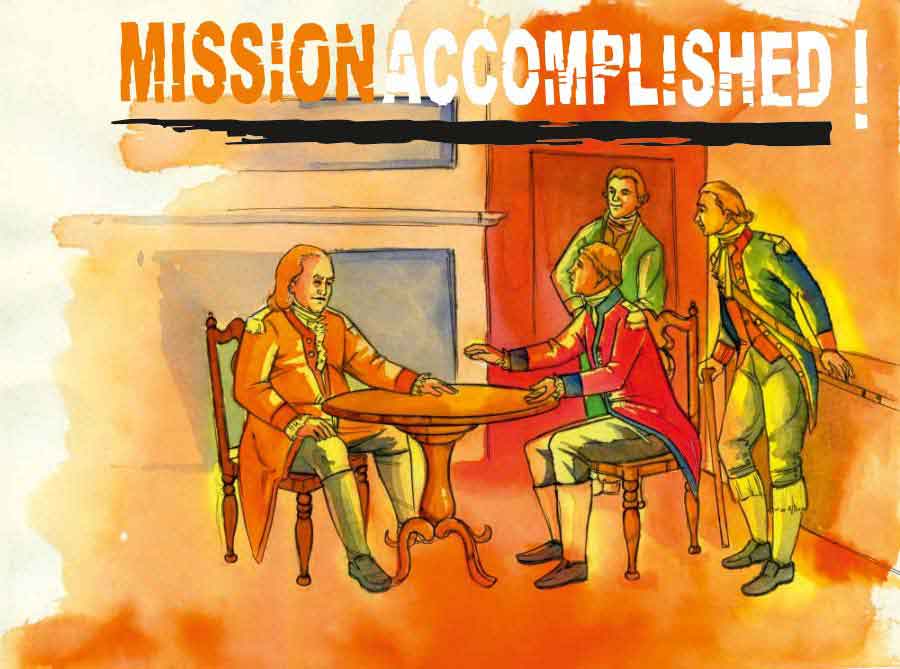
Mission Accomplished!
The American revolutionary war fought between Great Britain and America with its allies ended in September 1783 with signing of the ‘Treaty of Paris’. The treaty was signed by Franklin, John Adams and John Jay as representatives of America and by member of the British Parliament David Hartley as the representative of the British king. The treaty acknowledged the United States to be free, sovereign and independent states. It also declared that the British crown and all heirs and successors relinquish claims to the Government and also all the territorial rights. It was a formal declaration of the end of the British rule. It was a dream come true for all the Americans. The relentless efforts of the likes of Franklin finally met with success.

Bifocals
By 1783-84, Franklin was an old man in his late seventies. He was quite active even at that age but was suffering from weak eyesight. He required glasses to look at both close and distant objects. He was tired of changing his glasses all the time. Franklin was not somebody who would accept the problem as it is, without coming up with a clever and practical solution. He had to work out a solution, so he cut both the glasses in half and put them in a single frame. The distance lens was put at the top and the close range lens was put at the bottom. The arrangement worked wonderfully. This is what we today know as a bi-focal lens.

Extension Arm for libraries
Franklin spent a good amount of time in library in his later years. Due to his age, he started finding it difficult to take out books from the ceiling-high book selves. Climbing the ladders or stools frequently was very inconvenient for him. So, in 1786, he developed a simple device that would help him draw the books out of the shelf without climbing or probably even without getting off from his chair. It was a device which contained a long stick of wood or a long pipe. It had two protrusions or ‘fingers’ in the end. These fingers could be opened and closed by pulling a string that came down to the other end or the grip of the stick. This simple and practical device solved Franklin’s problem and became a very handy tool for whoever was willing to use it.
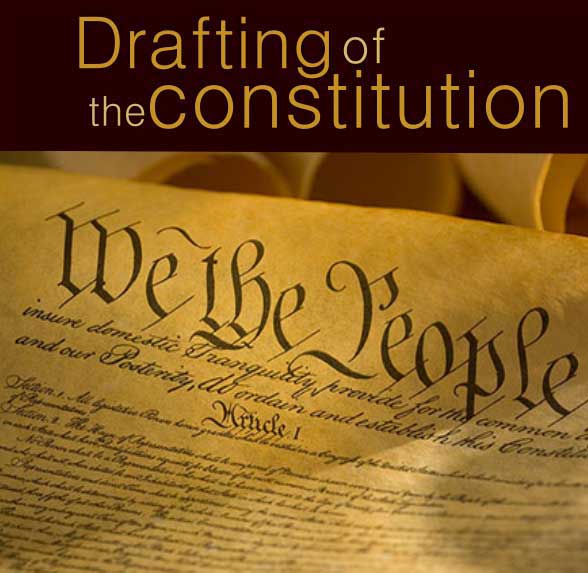
Drafting of the Constitution
Franklin stayed back in France for two years after the signing of the treaty of peace, as the Congress back home requested him to do so. When he finally returned home in 1785, he was immediately elected the President of the Council of Pennsylvania. In the next few years, he was re-elected twice for the same post and in 1787, he was sent to the conference arranged for drafting the Constitution of the United States. The drafting was marked by a lot of guidance and significant and useful suggestions from Franklin. Finally, the draft was ready and yet another document of monumental importance was signed by Franklin.

Crusader for abolishing slavery
Even though Franklin owned slaves in his younger days, he became a strong critic of this practice in his later years. In 1789, he became the president of the ‘Pennsylvania Society for Promoting the Abolition of Slavery’. The society not only advocated the end of slavery but also made efforts for the rehabilitation of the freed slaves. Franklin wrote and published several essays supporting abolition of slavery. He sent a petition to Congress on behalf of this society and asked for the abolition of slavery and ending of the slave trade. The Congress was meeting in the city of New York in February 1790. Franklin requested in his petition to ‘devise means for removing the inconsistency from the character of the American people’ and to ‘promote mercy and justice towards this distressed race (of slaves).’
There was a hot debate on this petition in both the House as well as Senate. Some pro-slavery senators opposed it strongly. But finally in April 1790, the petition was tabled and eventually passed.

The Farewell
Benjamin Franklin was now 84. The old problem of pleurisy had resurfaced again. Franklin’s health became delicate but he never let his age or health affect his spirit. He always remained positive and calm with his famous wit intact till the very end. He was suffering from a condition called ‘Emphysema’ which resulted in his lungs filling with the pus. He had great difficulty in breathing and was almost suffocating. His suffering continued for a few days. One day he asked his domestic help to make up his bed so that he could have a dignified death. His daughter Sally told him that she hoped he would live many more years. “I hope not” was Franklin’s retort to this.
Franklin died on April 1790, with his grandsons William Temple and Bennie by his side. It seems Franklin thought of people and of doing good to the society even while on his death bed. In his will, he left a large sum of money for the cities of Boston and Philadelphia. It was later used to build a trade school and a science museum and to fund scholarships and other community projects.
As the news of Franklin’s death spread, not only the city of Philadelphia but the entire country went into mourning. Franklin’s funereal was a huge public affair. About 20,000 people including the leaders from business, politics and public affairs gathered to pay their last respects to the beloved leader. As Franklin’s biographer Carl Van Doren has rightly remarked, “No other town burying its great man, ever buried more of itself than Philadelphia with Franklin.”
When Franklin had arrived in Philadelphia port in 1723, he was a poor, broke runaway whom no one noticed. On his death, a big fleet of ships in the very same harbour paid a tribute to him by flying their flags at half mast.
Next Biography
Related Events And Inventions





